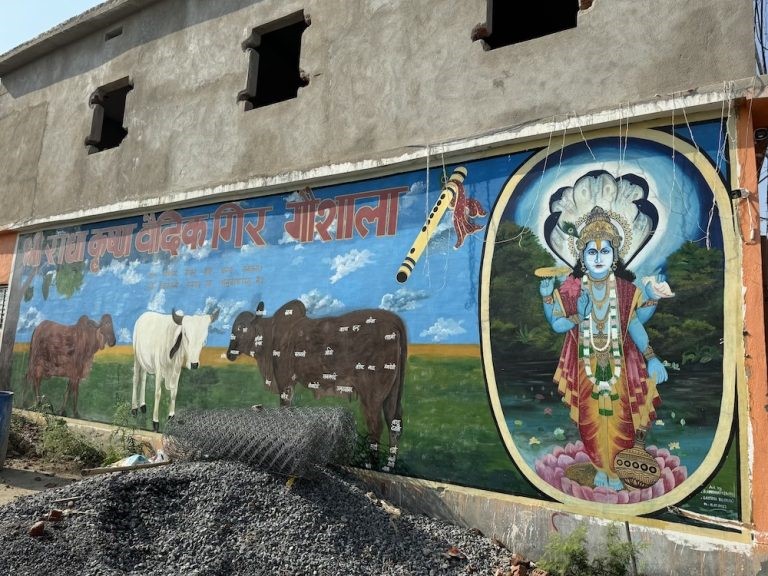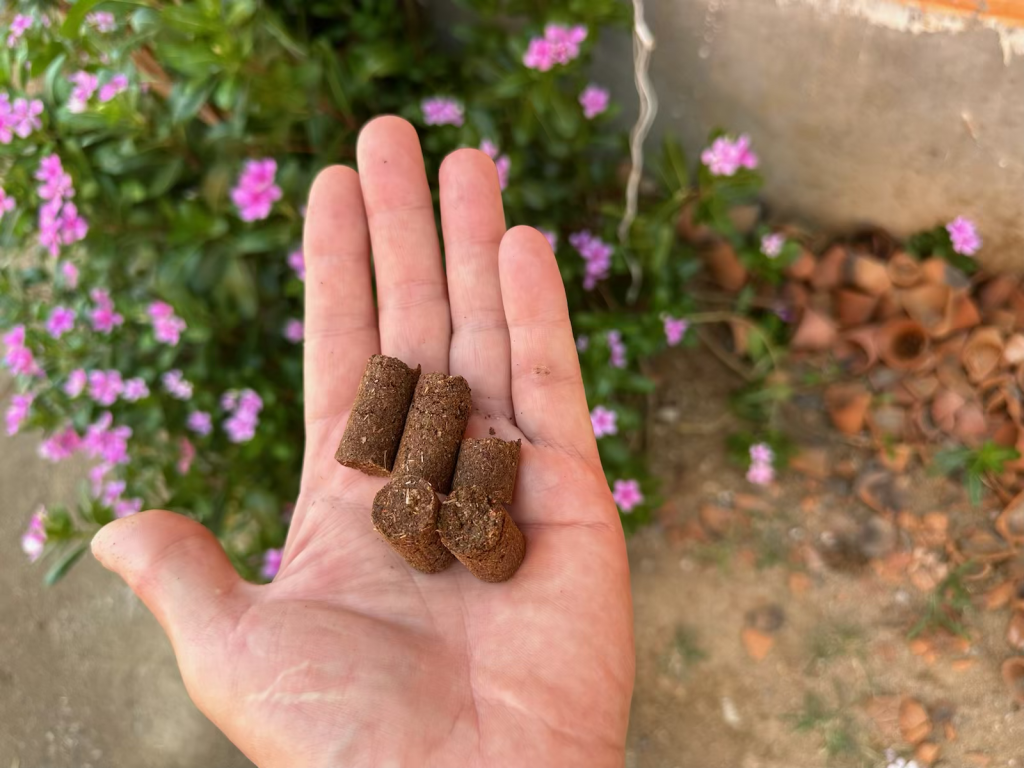
The author finds a newfound appreciation for the symbiotic relationship between humans and animals, and the boundless possibilities that arise when tradition meets innovation.
Bihar, India. Retirement often leads individuals down unexpected paths, and for one engineer and owner of private colleges, it meant venturing into the world of dairy farming with a unique twist.

Sri Radha Krishna Vaidic Goshala Farm, nestled in the countryside of Bihar, a herd of 150-plus Gyr cattle whose milk, urine, and dung are all transformed into health supplements.

Bihar lies in the river plains of the basin of the river Ganges. As a result, its land contains fertile alluvial soil and groundwater resources. This makes the agriculture of Bihar rich and diverse.

The author with Brajendra Choubay, owner of the amazing Sri Radha Krishna Vaidic Goshala Farm.
During my recent visit to Sri Radha Krishna Vaidic Goshala Farm, I was welcomed with warm hospitality and treated to liquid supplements made from calf urine, setting the tone for an eye-opening tour of the facility.

Before delving into the barn, I had the opportunity to sample the raw ingredients of an herbal supplement, highlighting the farm’s commitment to holistic health practices. This included tamarind and sesame.

Originating from the Gyr Hills of Gujarat, Gyr cattle are renowned for their hardiness and tolerance to tropical conditions, making them ideal for the farm‘s unique endeavor. These cattle are considered to be the first in the world and each cow at Sri Radha Krishna Vaidic Goshala Farm is meticulously cared for, with their pedigree and astronomical birth chart meticulously documented by the owner, Brajendra Choubay.

Gyr bulls are used on all kinds of soil to pull heavy loads. In general, they are very gentle and polite, and love to be with people. The Gyr cattle are very gregarious and form a very close circle at night with their calves sleeping under their heads.
Gyr cattle have an average lifespan is around 12-15 years. And during their lifetime, a cow develops 10-12 calves. On average, Gyr bulls weigh 1400 pounds and stand over six feet tall. They have long ears and tails with large horns bent back. They have a high hump reminiscent of buffalo that differs from other cow breeds. Gyr cows fall into either dairy (exclusive for milk) or dual (milk-and-work-keeping) category. The cattle of Sri Radha Krishna Vaidic Goshala Farm are solely used for dairy production.
In Ayurveda, Gyr cow‘s milk, ghee, curd, urine and dung together is known as ‘Panchgavya.’ Ayurveda is an alternative medicine system with historical roots in the Indian subcontinent. It is heavily practiced in India and Nepal, where around 80% of the population report using ayurveda. Panchgavya is said to be very useful to fight and cure many human and animal diseases.

Of course, cow dung acts as a natural fertilizer and used as raw manure. Regular consumption of cow urine is thought to destroy the cancer virus. Many Indians swear that Gyr urine helps purify the body and keep the mind calm.
Farmer Choubay’s cows are normally milked at 3:30 in the morning as sacred Hindi music waft over the barn sound system. In New York we have a dozen Shih Tzu who listen to classical music, so I felt right at home.
The dairy’s cows produce a much more expensive milk that ordinary cows, as well as ghee (a cross between grease and butter), in addition to dung and urine.

A specialty of this dairy farm is warm baths made with milk, urine and dried dung. There is no odor and this mud-bath-like process is surprisingly relaxing.
As I navigated the stalls, feeding the cattle mulched sugar cane and witnessing the diligent efforts of the barn hands in managing cow dung, I gained insight into the intricate workings of the farm.
From milking a nursing mama cow to experiencing the rejuvenating effects of warm baths made with cow products, every aspect of the farm left a lasting impression. The milking process was extremely intimate and I did not feel like I knew the mother well enough to violate her privacy with her son standing by, but i gave an embarrassed college try.
After carefully washing my hands, we sat down for more tea and then were offered calf urine and honey eye drops which stung but I swear my vision was sharper afterward.

One of the farm’s specialties lies in harnessing the power of cow dung, which is utilized in a variety of applications, including biogas production and earthworm mulch. Additionally, the farm produces high-quality milk and ghee, contributing to its reputation for premium dairy products.
Perhaps the most intriguing experience was testing the strength-enhancing properties of dry dung, a testament to the farm’s innovative approach to holistic wellness.
As I marveled at the transformation of cow products into health supplements, I couldn’t help but appreciate the harmonious blend of tradition and innovation that defines Sri Radha Krishna Vaidic Goshala Farm,‘s ethos.
In a world where health and wellness are paramount, Sri Radha Krishna Vaidic Goshala Farm, stands out as a beacon of ingenuity, showcasing the transformative potential of nature’s bounty in promoting holistic well-being.
As I bid farewell to the serene countryside of Bihar, I left with a newfound appreciation for the symbiotic relationship between humans and animals, and the boundless possibilities that arise when tradition meets innovation.
To visit Sri Radha Krishna Vaidic Goshala Farm, contact Mr. Brajendra Choubay directly by mobile at 91-9946-7600.

Follow Jim Luce on Facebook, Instagram, LinkedIn, TikTok, and X (Twitter).